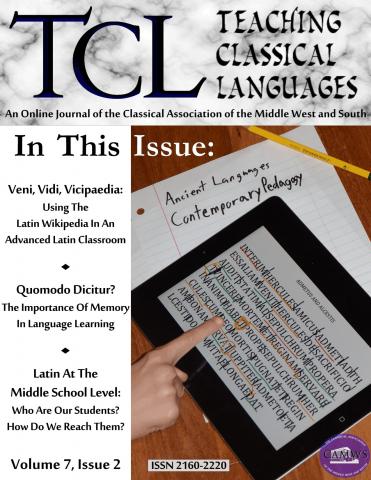Welcome to Teaching Classical Languages (TCL). TCL is the peer-reviewed, online journal dedicated to exploring how we teach (and how we learn) Greek and Latin. TCL is sponsored by the Classical Association of the Middle West and South (CAMWS).
Spring 2016

Abstracts of Articles
Quomodo Dicitur? The Importance of Memory in Language Learning
Second language acquisition (SLA) research results have substantially transformed the way languages are taught in the classroom, with a significant shift away from rote learning toward the creation of a communicative classroom environment. Yet communication is impossible without lexical and morphological competency. SLA researchers have begun to investigate the role of working memory in language acquisition, a field largely left previously to cognitive psychologists and neuroscientists. Much of SLA research in this area thus far has focused on the learning of English as a second language, but the findings have clear implications for the Latin classroom. This article provides a survey of recent research results, particularly as they pertain to learning vocabulary, and offers some ways in which Latin instructors can modify their pedagogy in order to optimize for their students both the acquisition and the retention of vocabulary. Also included are some activities with which teachers may begin to incorporate learning strategies that have proven to be effective.
Latin at the Middle School Level: Who Are Our Students? How Do We Reach Them?
An additional co-author is Tyler Leach, Baker Demonstration School, Wilmette, Illinois.
“Latin at the Middle School Level: Who Are Our Students? How Do We Reach Them?” is the result of collaboration among three experts in the theory and practice of Latin pedagogy. Barbara Hill, Latin Program Coordinator at the University of Colorado Boulder (now retired), provides explanations of important cognitive factors, which influence language learning, and offers general suggestions for teachers. Phonological processing is the focus of the first section of this article, and memory, especially working memory, takes center stage in the second section. Following the exposition of each cognitive attribute comes models of classroom activities to intrigue and educate middle school students. Rickie Crown, National Louis University, Chicago, contributes a wealth of multisensory classroom activities designed to enhance the phonological and working memory of students. Tyler Leach, Baker Demonstration School, Wilmette, takes the lead in the final section of the article and adds a valuable assortment of digital exercises and assessment measures designed to engage and instruct the active, independent-minded students, who inhabit America’s middle schools.
Veni, Vidi, Vicipaedia: Using the Latin Wikipedia in an Advanced Latin Classroom
Vicipaedia, the Latin Wikipedia, offers instructors an easy and flexible way to integrate composition assignments into a course. The high profile and immediacy of the site makes it uniquely attractive to students while the collaborative nature and complete transparency of the editing process recommend it to instructors. This paper documents the way Vicipaedia was incorporated into one advanced Latin class as a rich learning experience that resulted in better translation and increased understanding of the language. The students’ enthusiastic engagement with a broader, digital community also generated significant outcomes beyond those related to Latin language acquisition, ones that benefited not only the students themselves but also the instructor, the department, and the discipline.

